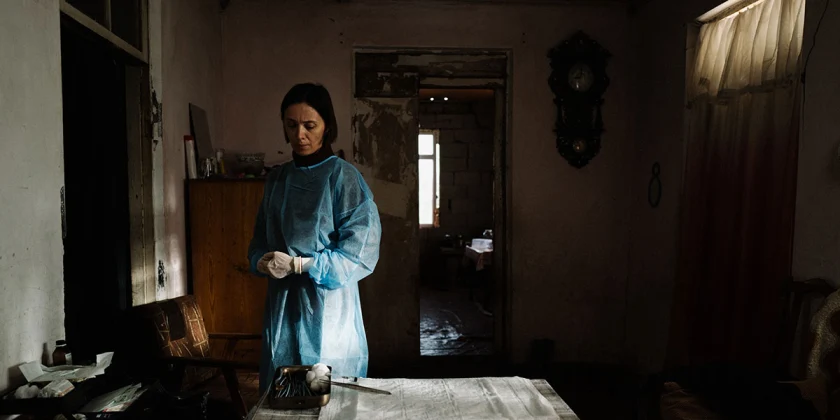APRIL
(director/writer: Dea Kulumbegashvili; cinematographer: Arseni Khachaturan; editor: Jacopo Ramella Pajrin; music: Matthew Herbert; cast: Ia Sukhitashvili (Nina), Kakha Kintsurashvili (David), Merab Ninidze (Head Doctor), Roza Kancheishvili (Nana), Ana Nikolava (Mzia), David Beradze (Mzia’s husband), Sandro Kalandadze (Young Father), Tosia Doloiani (Pregnant Young Mother), Beka Songulashvili (Picked-up Worker); Runtime: 134; MPAA Rating: NR; producers: Luca Guadagnino, Ilan Amouyal, David Zerat, Francesco Melzi D’Eril, Archil Gelovani, Gabriele Moratti, Alexandra Rossi; Memo Films; 2024-Georgia/Italy/France-in Georgian with English subtitles)
“It might be on point message-wise, but its story is strained.”
Reviewed by Dennis Schwartz
A challenging but slow moving film directed and written by the female Georgian filmmaker Dea Kulumbegashvili (“Beginning”) in the style of the Romanian New Wave. It’s about a female doctor under pressure for performing abortions. It might be on point message-wise, but its story is strained.
In a provincial town in the countryside of eastern Georgia, the abstinent and single Nina (Ia Sukhitashvili) works in a small hospital as an obstetrician and lives a secret life performing on the side abortions with her colleague (David Beradze).
A newborn dies after delivery in the hospital while under her supervision and she’s investigated for that tragedy.
Nina faces the wrath of society that condemns women who are independent and buck the local traditional way of life (under the influence of the Orthodox Church, which frowns upon abortions).
In today’s divisive political climate, which stretches across the globe, independent women are met with suspicion everywhere.
Performing abortions are not pleasant, but Nina says someone must do it in these trying times when women’s rights are under fire across the globe. We graphically observe when she performs an abortion on Nana (Roza Kancheishvili), a young deaf woman.
The filmmaker firmly believes that women should be in control of their own bodies when it comes to matters of sex or motherhood or medical treatment.
The film features a graphic childbirth opening scene. It also offers provocative thoughts on the timely topic of women’s rights, as it gives American viewers a chance to see how those in eastern Europe view the controversial topics on women’s rights.
If the film wasn’t so shrill, it would have been more watchable. But I will still recommend it as a relevant film for these times.
It played at the Venice Film Festival.

REVIEWED ON 10/26/2024 GRADE: B-
dennisschwartzreviews.com